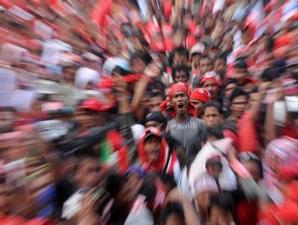By Dominic G. Diongson & Francezka Nangoy
In the days leading up to Suharto’s stepping down from power on May 21, 1998, Indonesia was a nation in crisis.
Demonstrations against the authoritarian regime erupted in major cities across the country. Ethnic Chinese businessmen, fearful of attacks on their shops, hastily packed up their families and belongings, leaving their cars literally at the departure curbs of airports for flights out of the country.
About a year earlier Indonesia had allowed the rupiah to trade freely against the dollar, and the nation’s economy went into a downward spiral.
With the currency’s sudden depreciation, the costs to repay dollar-denominated loans soon more than doubled, and prices of overseas goods soared — sending the inflation rate skyrocketing.
Soon thereafter, the social fabric of Indonesia unraveled, as hundreds of thousands of people became jobless from the bankruptcies of many small and large businesses. Discontent toward the government started to spill over into the streets.
When Michel Camdessus, the managing director of the International Monetary Fund at the time, presided with his arms crossed and looming over a seated Suharto, who was signing conditions of a bailout, the public became livid at the perceived Western subjugation of Indonesia.
Now, peace dominates the landscape among the nation’s 33 provinces and more than 17,000 islands. President Susilo Bambang Yudhoyono became the first leader to be elected for a second term since Suharto’s fall from 32 years in power. Indonesia’s economy remains among the fastest-growing across the Asia-Pacific region, as many of its more than 240 million people are being lifted out of poverty and moving into the middle class.
Indonesia, like many of its neighbors in Southeast Asia, has recovered from the 1997-98 financial crisis, and there are signs of further progress. The nation has paid its $23 billion debt to the IMF in full, and the government’s finances, for the most part, are in order.
In a report last year, the IMF said that “Indonesia’s economic performance has been impressive in recent years.”
While the wheels of fortune have turned for the better for Southeast Asia, Western nations are mired in debt. Indonesia’s public debt-to-gross domestic product ratio has fallen to 23 percent from 76 percent in 2001 due to its policy of maintaining fiscal discipline.
At the same time, European nations such as Greece, Portugal and Ireland turn to the IMF, the European Commission and the European Central Bank with their debts exceeding GDP. The United States itself faces chronically high unemployment rate at almost 8 percent.
Indonesia has also focused on domestic spending to help boost economic growth. The nation’s unemployment rate has fallen to a record low of 5.9 percent, about half of what it was just eight years ago. Minimum wages have also been increasing in major cities across the nation.
“Democratization is maturing, and there are a lot of young entrepreneurs in the business world now,” said Sandiaga Uno, an Indonesian businessman who operates a private-equity firm.
“Economic policies are becoming more transparent, and economic growth is becoming more sustainable and more evenly distributed,” he said.

As part of the nation’s initiative known as Reformasi in 1999 to transform Indonesia’s political, social and economic systems, regional governments have been given more power, allowing their provinces to thrive and develop.
There is greater transparency as well, with people more freely able to discuss subjects such as criticism of the president and institutions, once off-limits. Political parties are now free to form, and the media plays an important role in both informing the public and acting as a watchdog.
The National Social Security System (SJSN) Law, approved in 2004, has paved the way for the establishment of five social security programs: health insurance, employment injury, pension, old-age savings and death benefits.
There is also greater transparency in how the government performs its duties and conducts its business.
The formation of the Corruption Eradication Commission (KPK) has helped to root out rampant graft, a trait that was endemic during Suharto’s reign.
At the same time, though, Islamic radicalism — suppressed during the Suharto era — is gaining ground.
While the rule of law is yet to take hold firmly, the country is also moving in the right direction on this front.
Cek berita, artikel, dan konten yang lain di Google News












